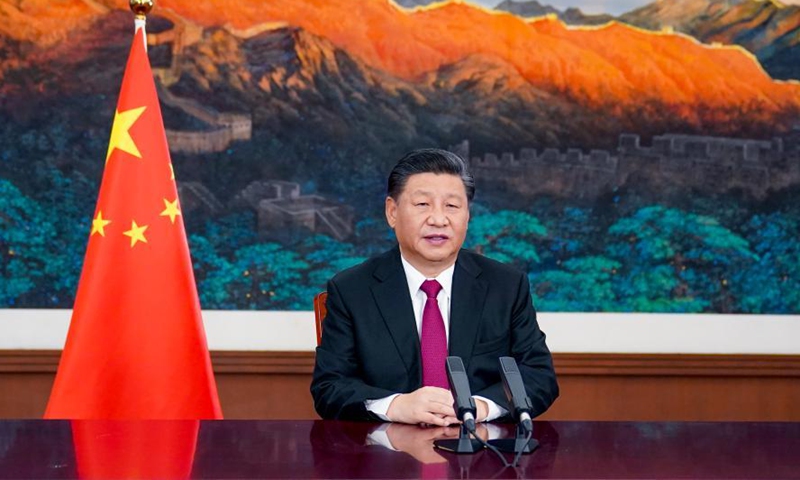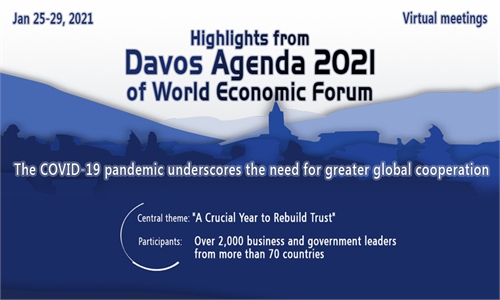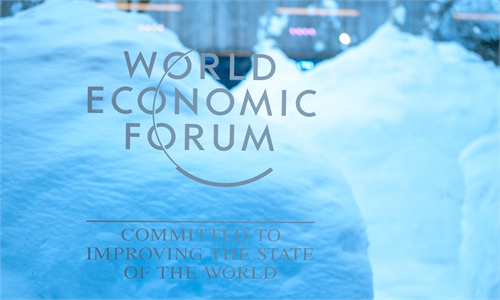
Chinese President Xi Jinping attends the World Economic Forum (WEF) Virtual Event of the Davos Agenda and delivers a special address via video link in Beijing, capital of China, Jan. 25, 2021. (Xinhua/Li Xueren)
Chinese President Xi Jinping on Monday calls for upholding multilateralism and building a community with a shared future for mankind to come together against global challenges at the 2021 World Economic Forum Davos Agenda, stressing that confrontation will lead all peoples to a dead end.
"Multilateralism is about having international affairs addressed through consultation and the future of the world decided by everyone working together," Xi said.
To build small cliques or start a new Cold War, to reject, threaten or intimidate others, to willfully impose decoupling, supply disruption or sanctions, and to create isolation or estrangement will only push the world into division and even confrontation, he said.
"We cannot tackle common challenges in a divided world, and confrontation will lead us to a dead end. Humanity has learned lessons the hard way. We must not return to the path of the past," Xi noted.
He stressed that international governance should be based on the rules and consensus reached among us, not on the order given by one or the few countries.
Zero-sum game or winner-takes-all is not the guiding philosophy of the Chinese people, Xi said. "As a staunch follower of an independent foreign policy of peace, China is working hard to bridge differences through dialogue and resolve disputes through negotiation and to pursue friendly and cooperative relations with other countries on the basis of mutual respect, equality and mutual benefit."
Xi said that China will continue to advance science, technology and innovation, while working with other countries to create an open, fair, equitable and non-discriminatory environment for scientific and technological advancement that is beneficial to all and shared by all.
According to the World Economic Forum Davos Agenda, leaders from other major economies including Germany, France, India and Japan are scheduled to join the forum, while key US figures didn't appear on the list.
"The major reason for US President Joe Biden's absence from the forum may be because the US domestic affairs take up too much energy, given that the US' fight against the COVID-19 outbreak in 2020 was a complete failure," Ruan Zongze, executive vice president of the China Institute of International Studies, told the Global Times on Monday.
However, in order to balance between fighting the outbreak and restoring its economy, the US needs to step up international cooperation and coordination, Ruan said, noting that Biden's absence is contrary to his promise to embrace multilateralism.
"Amid the pandemic and economic crisis, cooperation has become a common choice of many countries, which lays a foundation for multilateralism," said Chen Fengying, a research fellow at the China Institutes of Contemporary International Relations, noting that many economies expect to find a way out by referring to multilateral cooperation.
Themed "A Crucial Year to Rebuild Trust," the World Economic Forum this year aims to focus on creating impact, rebuilding trust and shaping the policies and partnerships needed in 2021, according to its press release.
It's worth noting that German Chancellor Angela Merkel, French President Emmanuel Macron and Indian Prime Minister Narendra Modi will also speak at the forum, sharing their plan for the "crucial year."
"The active attitude of Europe shows member countries' anxiety about how to restore economic growth while putting the pandemic under control in the post-COVID-19 era," Ruan said, noting that Europe would call for greater international cooperation at the forum, especially given lessons drawn from the US' absence in the international fight against the pandemic and economic recovery last year.
Liu Xiaoxue, an associate research fellow at the National Institute of International Strategy of the Chinese Academy of Social Sciences, told the Global Times that India will likely propose plans to expand international cooperation to attract foreign investment, while calling for information sharing in the fight against the outbreak.
According to data released by the Ministry of Statistics and Programme Implementation in India on January 14, India's GDP will contract by 7.7 percent in the 2021-21 fiscal year, Indian media The Hindu reported.
Along with the rollout of vaccines and potential large-scale vaccination, world leaders will also likely have a plan in terms of mutual recognition of vaccines and information sharing to better fight the pandemic, Liu said.
Global Times


